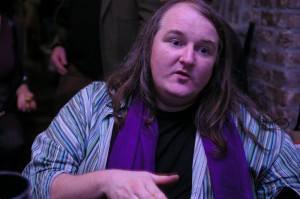
The following (posted below) is from an essay I have been working on since last fall. The essay attempts to think about CA Conrad's poetics in relation to biopolitics and radical conceptions of the 'the body'/somatic practices as potential sites for a universal subject.
It also is, unabashedly, in tribute to Conrad, who many of us can't help but feel is one of the great living poets of our time. Great, not only for the immensity of his vision and the force of his intelligence, but also for the multitudes he contains: friends, lovers, adversaries; parental and (great-)grandparental (ad infinitum) poets; places, communities, ecologies; the dead and undead with whom he consorts. I don't usually like to use evaluative terms like 'great'--so subjective and culturally relative are they--but I think it applies to Conrad. It is the only word I can think of, anyhow, to describe his work and person in relation to my own sense of the contemporary....
I remember seeing Conrad read for the first time in spring of 2007. Conrad’s best friend, the Philadelphia-based poet Frank Sherlock, had just recovered from a life-threatening illness, a meningitis which he contracted in Philadelphia, and nearly died from. It was Easter weekend at SEGUE series and Conrad said he did not believe in the resurrected Jesus, but that he did believe in the resurrected Sherlock. Conrad’s comment, interjected between readings of poems generated using his (Soma)tic Exercises, was powerful to me for the ways it deflated Easter’s otherworldly promises of salvation and transcendence.
During the poetry reading, Conrad also read a poem in which he intoned “fuck death,” a statement which I took to mean “forget death,” but also that one should have sex with death, that death undergirds life comingling life’s forces with its own. The confluence of living and dying, for Conrad, as for many gay men who grew up in the 80s and 90s, is an unforgettable, if not unforgiveable, reality. An unmistakable melancholy touches many of Conrad’s poems, and especially those poems collected in Deviant Propulsion and The Book of Frank in which people and things that have disappeared are often underscored through their absence—longed for, mourned. In many of Conrad’s poems the inanimate often becomes animated by a spirit of mourning—a longing for ex-lovers, as well as for the victims of sex and gender based crimes. Grief forms the conditions of possibility for action, communication, life loving. Animism grounds impossible return.
The occult and the actual meet most effectively for me in a set of constraint based exercises Conrad has been writing for the past few years, his (Soma)tic Exercises. There is of course a long tradition of poets using procedures, constraints, and chance operations to write their poems. Coleridge's use of opium and Baudelaire’s of hashish and alcohol; the “exquisite corpse” exercises of the Surrealists; the procedures of Fluxus, Jackson Mac Low, John Cage, and of course many others. What distinguishes Conrad’s exercises are their oddness, their queerness (both in the old fashioned and contemporary sense of this term). The (Soma)tic Exercises make one hyper-aware of their bodies—and a writing process issuing from the body—by estranging the body from its regular habit and use. The (Soma)tic Exercises, to quote a term from Heidegger, help us to experience “disuse”; through disuse our bodies are repotentialized as a site for the imaginary and for social interaction.
Last winter [2009] I had the pleasure of composing a (Soma)tic Exercise with Conrad. Our exercise was based on Downtown cellist Arthur Russell’s masterpiece, World of Echo. It is difficult to describe Russell’s World of Echo for anyone who hasn’t heard it before. It has a rare spiritual quality which issues from Russell’s song writing, voice, and cello playing, but also from the production values of the album. At one point, Conrad told me that he used the album to heal a knee injury that he had suffered. Russell was trained foremost as a musician and only afterwards as a Buddhist, so the healing powers of his music I can only imagine come from the confluence of these two disciplines.
For our exercise, Conrad and I decided to have Russell’s album playing on three different stereos throughout a four story house for a nine hour duration. Nine hours is a long time to do anything, and especially to listen to an album triply on repeat. Among the constraints we imposed upon ourselves, many had to do with memory: trying to forget the last line we had written before continuing; interrupting ourselves midline, then picking up with the line again. These exercises in attention and distraction I felt were true to Russell’s music. So was a certain circularity that the exercises were trying to induce amidst interruption and disjunction.
For my part, I spent much of the nine hours improvising lines with a set of books I had brought with me from NYC to Philadelphia, many of which were of a sacred or metaphysical import. Russell, perhaps more than any other composer I have come into contact with, understood the importance of tuning his body and his mind as instruments coeval with his cello and the other instruments (drum machines, guitar, tabla) he would use throughout his compositions. Via production (mediation) Russell gained access to the occult and otherworldly in ways similar to Conrad’s use of his own body as a source of information and vision.
--from “None of us have rules, none of us have scripture”: CA Conrad’s Advanced Elvis Course and the Politics of Spirit
Thom Donovan lives in New York City where he edits Wild Horses of Fire weblog (whof.blogspot.com) and...
Read Full Biography

